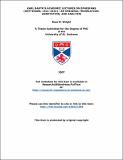Files in this item
Karl Barth's academic lectures on Ephesians (Göttingen, 1921-1922) : an original translation, annotation, and analysis
Item metadata
| dc.contributor.advisor | Torrance, Alan J. | |
| dc.contributor.advisor | Webster, J. B. (John Bainbridge) | |
| dc.contributor.author | Wright, Ross M. | |
| dc.coverage.spatial | 316 | en |
| dc.date.accessioned | 2007-12-14T14:44:26Z | |
| dc.date.available | 2007-12-14T14:44:26Z | |
| dc.date.issued | 2007-11-30 | |
| dc.identifier | uk.bl.ethos.552057 | |
| dc.identifier.uri | https://hdl.handle.net/10023/399 | |
| dc.description.abstract | This thesis consists of an original translation, annotation, and analysis of Karl Barth’s Academic lectures on Ephesians, delivered in Göttingen, winter semester, 1921-1922. The translation is composed from a typescript of Barth’s handwritten manuscript, located in the Karl Barth Archives, Basel, and is annotated for scholarly research, including complete bibliographical information on Barth’s sources. Barth’s exposition is a detailed exegesis of the Greek text of Eph. 1:1-23, comprising 13 lectures, with a summary of Ephesians 2-6 in the final chapter. Materially and formally, the exposition strongly resembles Romans II and Barth’s 1919 sermons on Ephesians, which the study examines. It also exhibits the theological objectivity of the Göttingen period, chiefly because of Barth’s explication of gnosis in Ephesians and his appropriation of Calvin’s theology of the knowledge of God. Barth made a material discovery in his study of Ephesians that fundamentally shaped his subsequent theology. He observes in Eph. 1:3-14 a train of thought which witnesses to God’s action to the creature in Christ and the creature’s subsequent movement to God. He concludes that we have come from God, who has chosen us in eternal election, and we are moving toward the glory of God, our divinely appointed goal. The exposition’s central theme is expressed in Barth’s claim that “the knowledge of God is the presupposition” and “the goal” of human existence. The distinguishing mark of Barth’s theological exegesis is its concreteness, that is, his ability to speak about the text’s contemporary meaning without lapsing into theological abstraction. This concreteness is the consequence of his theological hermeneutic. He describes the interpretive event as a field of action, consisting of the biblical text, the activity of the interpreter, and the divine speech act. | en |
| dc.format.extent | 1622735 bytes | |
| dc.format.mimetype | application/pdf | |
| dc.language.iso | en | en |
| dc.publisher | University of St Andrews | |
| dc.subject | Theological exegesis | en |
| dc.subject | Exposition of Ephesians | en |
| dc.subject.lcc | BS2695.W8 | |
| dc.subject.lcsh | Barth, Karl, 1886-1968--Contributions in Biblical exegesis | en |
| dc.subject.lcsh | Bible. N.T. Ephesians, I, 22-23--Criticism and interpretation | en |
| dc.subject.lcsh | Bible. N.T. Greek--Criticism and interpretation | en |
| dc.title | Karl Barth's academic lectures on Ephesians (Göttingen, 1921-1922) : an original translation, annotation, and analysis | en |
| dc.type | Thesis | en |
| dc.type.qualificationlevel | Doctoral | en |
| dc.type.qualificationname | PhD Doctor of Philosophy | en |
| dc.publisher.institution | The University of St Andrews | en |
This item appears in the following Collection(s)
Items in the St Andrews Research Repository are protected by copyright, with all rights reserved, unless otherwise indicated.

